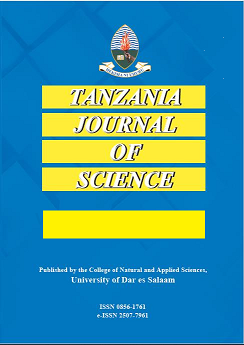Ethnobotanical Survey on the Knowledge and Use of Medicinal Plants for Malaria Management among University Students
DOI:
https://doi.org/10.4314/tjs.v49i3.2Keywords:
Malaria, Medicinal plants, Ethnomedicine, Antimalaria, TanzaniaAbstract
Malaria remains a public health problem in Tanzania, escalated by the emergence of both parasite and vector resistance. Plant-based traditional medicines have been widely utilized as alternatives to malaria management. However, proper documentation is minimal, especially among the younger generation. This study assessed the knowledge of medicinal plants for malaria management among 532 Dar es Salaam University College of Education students. Overall, twenty-four plant species, most belonging to the family Asteraceae, were identified with Azaradichta indica being the most dominant species. These results reveal a substantial knowledge of medicinal plants for malaria management among university students.


